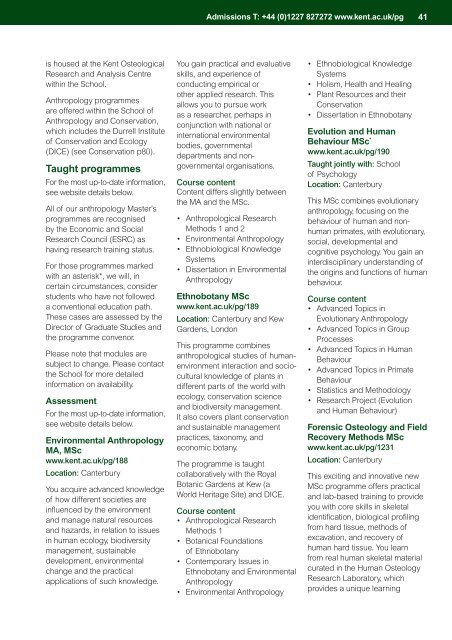prospectus
You also want an ePaper? Increase the reach of your titles
YUMPU automatically turns print PDFs into web optimized ePapers that Google loves.
Admissions T: +44 (0)1227 827272 www.kent.ac.uk/pg<br />
41<br />
is housed at the Kent Osteological<br />
Research and Analysis Centre<br />
within the School.<br />
Anthropology programmes<br />
are offered within the School of<br />
Anthropology and Conservation,<br />
which includes the Durrell Institute<br />
of Conservation and Ecology<br />
(DICE) (see Conservation p80).<br />
Taught programmes<br />
For the most up-to-date information,<br />
see website details below.<br />
All of our anthropology Master’s<br />
programmes are recognised<br />
by the Economic and Social<br />
Research Council (ESRC) as<br />
having research training status.<br />
For those programmes marked<br />
with an asterisk*, we will, in<br />
certain circumstances, consider<br />
students who have not followed<br />
a conventional education path.<br />
These cases are assessed by the<br />
Director of Graduate Studies and<br />
the programme convenor.<br />
Please note that modules are<br />
subject to change. Please contact<br />
the School for more detailed<br />
information on availability.<br />
Assessment<br />
For the most up-to-date information,<br />
see website details below.<br />
Environmental Anthropology<br />
MA, MSc<br />
www.kent.ac.uk/pg/188<br />
Location: Canterbury<br />
You acquire advanced knowledge<br />
of how different societies are<br />
influenced by the environment<br />
and manage natural resources<br />
and hazards, in relation to issues<br />
in human ecology, biodiversity<br />
management, sustainable<br />
development, environmental<br />
change and the practical<br />
applications of such knowledge.<br />
You gain practical and evaluative<br />
skills, and experience of<br />
conducting empirical or<br />
other applied research. This<br />
allows you to pursue work<br />
as a researcher, perhaps in<br />
conjunction with national or<br />
international environmental<br />
bodies, governmental<br />
departments and nongovernmental<br />
organisations.<br />
Course content<br />
Content differs slightly between<br />
the MA and the MSc.<br />
• Anthropological Research<br />
Methods 1 and 2<br />
• Environmental Anthropology<br />
• Ethnobiological Knowledge<br />
Systems<br />
• Dissertation in Environmental<br />
Anthropology<br />
Ethnobotany MSc<br />
www.kent.ac.uk/pg/189<br />
Location: Canterbury and Kew<br />
Gardens, London<br />
This programme combines<br />
anthropological studies of humanenvironment<br />
interaction and sociocultural<br />
knowledge of plants in<br />
different parts of the world with<br />
ecology, conservation science<br />
and biodiversity management.<br />
It also covers plant conservation<br />
and sustainable management<br />
practices, taxonomy, and<br />
economic botany.<br />
The programme is taught<br />
collaboratively with the Royal<br />
Botanic Gardens at Kew (a<br />
World Heritage Site) and DICE.<br />
Course content<br />
• Anthropological Research<br />
Methods 1<br />
• Botanical Foundations<br />
of Ethnobotany<br />
• Contemporary Issues in<br />
Ethnobotany and Environmental<br />
Anthropology<br />
• Environmental Anthropology<br />
• Ethnobiological Knowledge<br />
Systems<br />
• Holism, Health and Healing<br />
• Plant Resources and their<br />
Conservation<br />
• Dissertation in Ethnobotany<br />
Evolution and Human<br />
Behaviour MSc *<br />
www.kent.ac.uk/pg/190<br />
Taught jointly with: School<br />
of Psychology<br />
Location: Canterbury<br />
This MSc combines evolutionary<br />
anthropology, focusing on the<br />
behaviour of human and nonhuman<br />
primates, with evolutionary,<br />
social, developmental and<br />
cognitive psychology. You gain an<br />
interdisciplinary understanding of<br />
the origins and functions of human<br />
behaviour.<br />
Course content<br />
• Advanced Topics in<br />
Evolutionary Anthropology<br />
• Advanced Topics in Group<br />
Processes<br />
• Advanced Topics in Human<br />
Behaviour<br />
• Advanced Topics in Primate<br />
Behaviour<br />
• Statistics and Methodology<br />
• Research Project (Evolution<br />
and Human Behaviour)<br />
Forensic Osteology and Field<br />
Recovery Methods MSc<br />
www.kent.ac.uk/pg/1231<br />
Location: Canterbury<br />
This exciting and innovative new<br />
MSc programme offers practical<br />
and lab-based training to provide<br />
you with core skills in skeletal<br />
identification, biological profiling<br />
from hard tissue, methods of<br />
excavation, and recovery of<br />
human hard tissue. You learn<br />
from real human skeletal material<br />
curated in the Human Osteology<br />
Research Laboratory, which<br />
provides a unique learning



